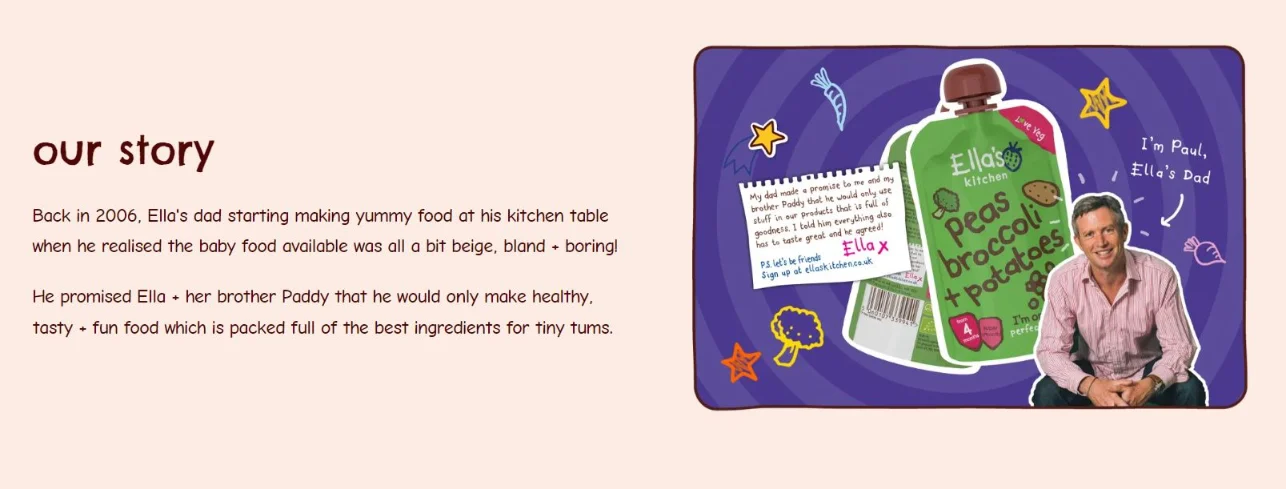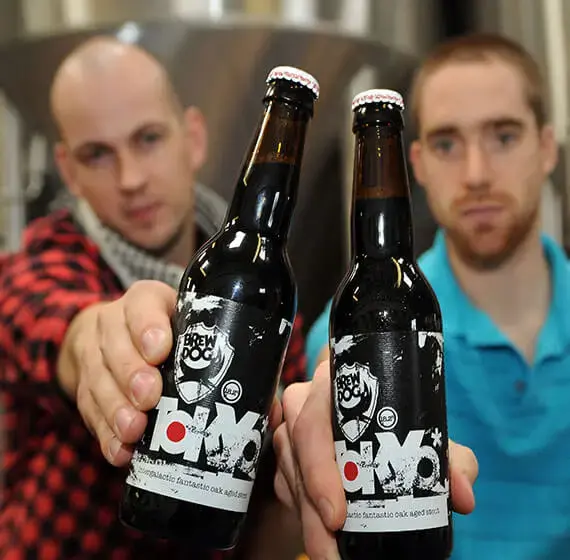I wrote a version of this blog 7 years ago which was published on Nominet (Domain UK). This is a bigger, better, updated version!
Once upon a time there was a beautiful business. It was shiny and new and dreamt of selling high quality, handmade products for all the girls and boys to enjoy. But this tiny new business was anonymous, and struggled to compete in a terrifying, vast digital landscape. Although everyone liked their cute Instagram posts this little business constantly struggled to find its voice and make friends…
Does this story sound familiar?
We’re living in a world where we can order groceries from the sofa, pay our bills from the kitchen and purchase clothes on the toilet. (I don’t do that!) But I do work with clients all over the world without ever leaving the house. Although the internet rewards us with convenience and quick transactions, human contact is being diminished. As businesses we need to prevent turning into faceless entities and instead find strategies that are going to drive engagement and connect with our audience. One of the best ways to achieve this is through brand storytelling.
Although brand storytelling isn’t a new concept, it’s sometimes overlooked as a strategy by smaller companies. With the help of a few examples we’re going to be looking at what brand storytelling is. We’ll also be exploring what makes a good story to better understand its value and how it can benefit your business.
What is brand storytelling & why is it important?
Brand storytelling is the practice of sharing the authentic story behind your brand. More than just a narrative it should be used to explain the existence of your brand and reinforce its values, ethos and beliefs. It’s the overarching messaging behind all your brand’s communications. In essence it’s the heart and soul of your business; a way of sharing your passions and building a culture that distinguishes you from your competitors. And yes, the B2B industry can do brand storytelling too.
How important is storytelling in marketing?
Very! As a primal form of communication allowing humans to share a collective unconscious, stories trigger physical changes in the brain. They ignite our imagination allowing us to become participants in the story. In other words, powerful and emotive stories will be more relatable and memorable so you can see why it’s crucial for faceless online businesses to implement storytelling in their strategies.
What makes a good story?
What do all our favourite stories have in common? The popular themes are good vs evil, love concurring all, perseverance, and success in the face of adversity. But above all else, stories need to be told in a believable, genuine and heartfelt way. So, even if the reader can’t directly relate to the story it gives them the ability to empathise or buy into the story and its characters. Ultimately, a good story should be able to stir an emotion and connect the author with the reader. And this is no different to brand storytelling.
On Instagram you see a lot of micro businesses sharing their personal stories. But, since using trending templates and audio is encouraged by the platform a lot of content feels like a direct regurgitation and I personally believe it falls far off the mark. Remember that your story is unique so tell it in a unique way. Otherwise the effort that you’re putting into making reels and video will have very little impact.
What is the impact of Brand Storytelling?
An authentic story will resonate with your target audience helping you to achieve the following benefits:
1. Makes businesses more memorable
On average we spend 6 and half hours on the internet everyday and encounter dozens of adverts from businesses every hour. With a truthful and heartfelt story behind your brand people will remember it. If you’re able to talk about your products and services in a unique way (because your story is uniquely yours) it can make businesses 22 times more memorable as a result of the chemical and emotional changes within the brain.
When brands convey their story it makes them more memorable. When I sat down to write this article I could instantly recall a number of companies –big and small – made memorable by the stories they sold. Developing a story gives a company a unique and memorable identity.
2. Builds a sense of belonging
In the absence of shows like Top of Pops it’s harder for people to belong to a tribe. In my teens (before the days of ecommerce) I identified as an emo/indie kid and would only shop at a little, grubby, underground shop because the owner had amazing big hair and I felt he truly knew who I was and understood my world. The need to belong still very much exists and whether we mean to or not, we’re attracted to those that have similar traits, styles and beliefs, directly influencing where we shop. A brand story is your chance to share what you’re into, what concerns you’re trying to address, and what you’re advocating for – so sing it loud and let others join in.
3. Builds brand loyalty
‘Fans’ are different from customers! Unlike customers who may make a quick improtue purchase, fans will advocate for you, recommend you, and help you build a profitable brand. It’s always best to create your brand around the people because you’ll always stand out on digital platforms. Let’s be honest, we can spot AI generated videos and text a mile off! So, think less about the speed in which you can churn out content and instead focus on creating high quality, person-to-person content.
Because a good story has the ability to connect with audiences it invites consumers to connect on a more personal level. If consumers share the beliefs and motives behind a story, people are much more likely to connect with your brand. The benefits are that audiences develop a sense of brand loyalty because they support your cause.
When I set up Yabber Marketing I didn’t want to simply include my CV on my site. Yawn. Instead my experience is woven into a more complex story called My Journey to Yabber, which explains how I’d always wanted to work for myself and how the jobs I landed allowed me to get there.
4. Provides authenticity
Stories are born from personal accounts and influences, meaning no two stories are ever the same. Telling your story is therefore going to help to differentiate you from your competitors. Allow your personal experiences to shape your company and provide that personal touch.
5. Encourages buy in
A gripping story will have audiences hooked. Many companies take the approach of sending company updates. These don’t necessarily have to be descriptive accounts of office antics, they could simply be a weekly-round up of what inspires your staff or describing the challenges they face with particular projects.
However you choose to do it, make sure that updates are consistent and sent around the same time each week. Once people are drawn into the narrative being built they will expect and want to see more.
Best examples of brand storytelling
The story behind the brand
The story behind a brand’s existence is probably the most common approach to brand storytelling. It is a chance for brands to outline motives, values and on-going commitments told in a way that allows the reader to relate with these core principles.
Ella’s kitchen is a great example of this. The brand was set up by a father who was keen to provide his daughter – Ella – with nutritional, non-bland baby food and their story is so central to the brand’s identity. Ella’s kitchen uses their story to connect with parents who share the very same values and concerns which attracts buy in and memorability.

The people behind the brand
Providing regular updates tells an on-going story about a company. It creates transparency and helps build a connections. Company updates should be personal, genuine and fun. With the help of Reels and platforms like TikTok, showing off the face behind a brand has become almost the ‘norm’, but there are impactful ways of doing this that cut through the noise.
I work with an amazing company called T2 Fitness. They are a boutique training provider for Fitness Education and qualifications. They are super motivated by working and interacting with individuals, motivating them and watching their individual progress. As a business they compete with hundreds of other training providers, but because they regularly share their personal views and stories they are a much more personable brand compared to their competitors and they are amazing at it.
The personal quest
This is the classic story of triumph over adversity and many well-known entrepreneurs are eager to relay their experiences. The founders of Brew Dog tell an honest and inspiring story about crafting beers in their garage, securing funding in unconventional ways and growing into a global business. What makes their story so memorable is their honesty and determination.
At the point when banks stopped lending them money they don’t shy away from sharing how scared they were. Instead, they got motivated to be disruptive and established their ground-breaking Equity for Punks. This ‘anti-business’ model of seeking investment by giving people the opportunity to buy shares in their own business is enough to arouse the dead.
I was fully onboard with ‘Equity for Punks’.

The community quest
Clothing brand Finisterre unites people with a mutual love of the sea. Their story describes how their clothing is made by surfers for surfers battling the English weather. By attributing their successes to their loyal customers they successfully build a sense of community; a sense of belonging and togetherness. This is further reinforced by all of the sustainable and charitable initiatives they run that bring sea lovers and protectors together through the Finisterre brand. This strategy draws you in and makes you want to play a part in their journey.

Customer stories
Most businesses want to convey that their product or service is ‘life changing’, but without the social proof consumers are savvy enough to smell an empty claim. That’s why when we started working with the School of Stitched Textiles we asked their graduates to tell us their stories. And so we launched a blog series called Graduate Stories. This is an amazing archive of personal stories from students that have studied with the school. Many of them talk about the life changing impact the courses have had had on their mental wellbeing, creative confidence, and how the courses have enabled them to change careers. These are honest, first person accounts that focus on the students’ achievements and they really help to encourage other students onto courses.

Tips for good storytelling
If you’re ready to tell your story follow my 3 main tips for success:
- Be honest: People like to hear about the good, the bad and ugly. Including the not so nice details shows authenticity, relatability and personal determination
- Be unique: It can be so tempting to copy from larger businesses that are killing it. But if you want genuine ‘buy in’ from customers you need to tell your unique story.
- Be consistent: Your messaging should reinforce your business goals and objectives. Keep your story at the forefront of all messaging and communications.
Go! Tell your story!
Consumers today are a savvy and conscientious bunch. They care about where and who they buy from and brand storytelling is a great opportunity to connect with audiences and influence their purchasing decision.
There are many different approaches to storytelling. Whichever approach you take, remember that stories are your chance to define yourself and your brand. With an ability to connect with audiences, stimulate emotion and become more memorable, storytelling is becoming an essential part of business strategies and is an approach that can be adopted by companies large and small – whatever your niche!
Remember that brand storytelling is not just about painting a picture, but more about getting your audience to buy in and support your motives and values. So, figure out what story you want to tell and make sure that it is reflected in your approach and all your marketing communications. Make a blog, tell your story and show the world who you are.
….And they all lived happily ever after.

